Photo by Theo Wargo via Getty Images
In Orbit: Tony Touch
The East Brooklyn DJ reflects on the Afro-Latino contributions to hip-hop and witnessing a culture's birth from the outer edges of the borough
“In Orbit” spotlights some of the stars joining us at the Planet Brooklyn music and culture festival this weekend. Tony Touch, a celebrated selector and producer from East New York, is set to spin at the Afro-Latino Festival block party at Fulton Avenue and Ashland Place on Sunday, August 24
In the beginning, it all went down in Highland Park. That’s where the legendary function DJ, mixtape DJ, and record producer Tony Toca, aka Tony Touch, got his start in hip hop, as a breakdancer in his early teens. The park is beyond Bushwick, wedged between Cypress Hills and the Jackie Robinson Parkway, and it is where Tony, born in 1969, and the kids in his neighborhood went to spend the dog days of Summer and develop their artform. “In Brooklyn, it was a lotta street dancing, man, we’d get the cardboard refrigerator boxes, open them up, we’d get our hands on some linoleum and we’d go to the park,” Tony tells me over the phone on a Thursday afternoon.
We’re reminiscing on the early days of hip-hop in Brooklyn because this weekend, Tony will be spinning at founder and co-director Mai-Elka Prado’s Afro-Latino Festival, a block party at the Planet Brooklyn music festival this weekend that serves as a celebration of the Latino Caribbean diaspora in Brooklyn. Today we understand Brooklyn as a hotbed of hip-hop, a mecca that calls rap’s GOATs its native sons, where you can find it live or spinning in clubs every night of the year. But in his childhood, oriented around East Brooklyn between the late 1970s and early 1980s, BK was a backwater commuter borough, and hip-hop was scarce, more of a Bronx, Manhattan, and Queens phenomenon at the time.
Tony watched from afar while practicing in Highlands with a diverse crew of Canarsie kids. It would be years before he became a DJ as a teenager when he moved to Orlando, but in Brooklyn, it was a passion he couldn’t afford. “It didn’t cost to dance. To DJ, you need equipment, records. So I was dancing before anything. That was my introduction to hip-hop, my first love,” Tony says.
In the city, Tony would partake in the soup of influences that made up the city’s music scene at the time at spots like the legendary Funhouse in Hudson Yards. “In the teen clubs, they played hip-hop, new wave, punk rock, there was R&B, electro pop”—and he’d take these influences home with him, first to Florida, then back to East Brooklyn, where post-high school, in the early 90s, he found a developing scene as a DJ. “Manhattan still had the clubs, I used to go to Red Zone, the Tunnel, but there were house parties. Parties in the park were live. Rollerskating culture was big. I used to go to the rink on Empire Boulevard.”
By the time he got back to the borough, Brooklyn’s hip-hop scene had changed radically. The mark of its transformation was getting the opportunity to spin, just as a local DJ playing in and around Kings County, ahead of the Wu-Tang Clan’s first show in NYC at a club called Showboat, a concert RZA claims ended in a shootout, and that the group was only paid $200 for. “Showboat had a lot of history, man. A lot of performers went through there, and I was the resident DJ for a while.” Wu-Tang would return the favor roughly a decade later when they dropped the B-Side classic “The Abduction” on his major label released compilation album, The Piece Maker.
Even as the borough’s rap flourished, the Puerto Rican representation coming out of Brooklyn was limited. That is not to say it was non-existent. “There was Prince Markie Dee from The Fat Boys from Brooklyn, God bless his soul. We could also go with Thirtstin Howl The 3rd, old school Brooklyn guy,” Tony reflects. And the DJ would do his part, too, mixing salsa and merengue into his sets with rap, rock, and reggae. “My DJ sets have always implemented all the elements of music and culture that are hip-hop and make up hip-hop, and continue to evolve.”
It’s a tradition and life’s work that will continue at the Afro-Latino Festival block party on Ashland Place and Fulton Ave this weekend at the Planet Brooklyn festival. Mai-Elka Prado casts Tony’s body of work as perfectly aligned with the festival’s mission over the past 12 years. “It’s a celebration of Latino people of African descent, brought to New York in connection with non-profit organizations from Latin America. So our curatorial work for a Planet Brooklyn in this collaboration with Tony Touch is super important for us, as he’s a legendary DJ and pioneer. When we were talking about the diversity in the audience, how our audiences are intergenerational, Tony is a talent and a history that unites all those experiences,” Prado says.
It seems like every few weeks a stupid ass argument breaks out online over the role of New York City’s Latino community in the beginnings of hip hop, downplaying their essential role in the development and dissemination of the culture. From his relatively isolated childhood in Brooklyn, Tony himself couldn’t really understand it until later, when he saw it reflected in culture. “It wasn’t until I saw it in the movies. The movie that really opened me up to realizing how involved Spanish kids were in hip-hop was Flashdance. That one breaking scene that went like two minutes was my first glimpse of Rock Steady [Crew] and kids of color, Hispanic kids in this movie killing it, and it was a complete game changer and eye-opener.”
The irony is, Tony didn’t need to see that experience in any theater to confirm the immeasurable Afro-Latino contribution to the inception of hip hop. He was living it out, dancing on broken-down refrigerator boxes and linoleum in Highland Park.
You might also like 























